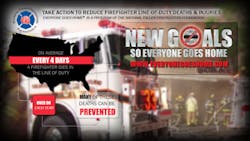Officials: Cancer in Fire Service is an Epidemic
WASHINGTON, D.C. – Cancer in the fire service is not just a problem, it’s an epidemic.
While multiple studies in the United States and abroad have shown the correlation to firefighting and the increase occurrences of cancer, it will take a change in culture to stem the tide.
Getting responders to take preventative measures to protect themselves and their loved ones sounds like a no-brainer, but fire service leaders understand it’s not that easy.
U.S. Fire Administrator Ernie Mitchell said it distresses him to see cancer claiming so many firefighters.
“Firefighters face many hazards in the line of duty. What do we do about it?” Mitchell asked fire officials this week at a strategy meeting in the nation’s capital.
It saddens him to attend the funerals of fellow firefighters stricken with the disease.
Taking a suggestion from attendees at the recent Tampa II Summit, the National Fallen Firefighters Foundation convened a brief conference – not only to hear about cancer studies but to discuss what to do with the data.
“This is not a NFFF meeting. We are hosting this on behalf of you,” NFFF Chairman Dennis Compton told the attendees.
While firefighters are being encouraged, and, in some departments ordered, to wear SCBA during overhaul, some believe that’s not enough. They should also be masked up during training, investigations as well as at vehicle and vegetation fires.
“Firefighters say they don’t usually wear SCBA during overhaul because they can better detect a rekindle,” said Dr. Virginia Weaver, associate professor at Johns Hopkins University.
Firefighter Cancer Support Network President Bryan Frieders is upset about the nonchalant attitudes.
“Our culture, our behavior is killing us. We can’t continue to condone certain actions,” he said. “It’s not OK to show a firefighter with a sooty face to recruit or sell something. It’s not OK to walk into the sleeping quarters with gear or dirty boots on. It’s not OK to see unattached exhaust hoses dangling from the ceiling.”
Frienders challenged his colleagues: “Are they bugles or plungers? Maybe you are the problem…”
Phoenix Chief Kara Kalkbrenner said firefighters in her department are taking the cancer threat very seriously. Some shower after every call, and always have clean clothes to change into. But, others admitted that's not the case across the nation.
Among the suggestions that surfaced during the conference include:
- Shower after all fire and EMS calls
- Wash turnout gear after response, and have a second set on hand
- Include women and minorities in cancer studies
- Don’t allow smoky turnout gear to be hung in the firehouse or carried in vehicles
- Keep turnout gear out of bunkrooms
- Include families of firefighters in studies
- Establish a central repository for data relating to cancer in firefighters
- Use social media to carry the message about the dangers
- Every basic textbook and class should include a cancer-related section
- Let it known that having a dirty, sooty helmet is no longer a badge of courage
After a draft report is compiled, some of the same stakeholders will reassemble to discuss an action plan.
NFFF Executive Director Ron Siarnicki said he was pleased with the input.
"It's a tough subject," he said. "And, change is difficult. But to reduce the chance of cancer, that's what has to be done..."
